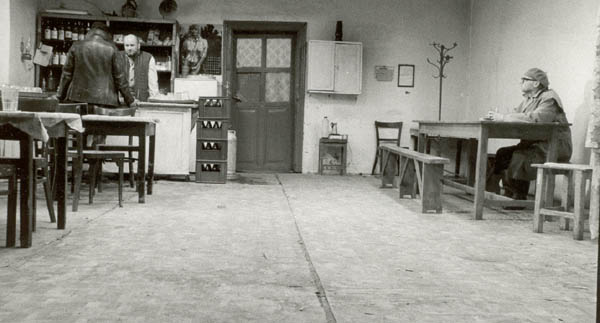Early in 2009, I received a phone call from Béla Tarr, asking me if I could write a page about Sátántangó (1994) for a Hungarian newspaper to celebrate its 15th anniversary. Here’s what I sent him. —J.R.
Sátántangó at 15
Congratulations to Sátántangó on its 15th anniversary. Now that it’s a teenager, I’m happy that English-speaking fans can finally, at long last, look forward to an English translation of László Krasznahorkai’s novel. As a member of PEN, I was invited last year to suggest literary works for English translation. After I proposed Sátántangó and they published my response, I received a note from Barbara Epler of New Directions: “We are waiting on the delivery of its translation by the great George Szirtes, eagerly waiting, and will publish it as soon as we can. (We already have his translations of László’s The Melancholy of Resistance and War & War.)” So once it appears, I’ll no longer have to depend on the French translation by Joëlle Dufeuilly (2000) published by Gallimard, which I’ve owned for many years.
The film finally became available here last year on DVD from Facets Video, helping to demonstrate how much cinema as a “language” is more easily translatable than literature. For many years, Béla and I have had a running debate about the relation of the film (and, by implication, the novel) to my favorite novel in any language, William Faulkner’s Light in August (1932), which also focuses largely on the simultaneous events of a single day in a depressed, flat rural area as seen through the consciousness of several alienated characters-—alienated from themselves as well as from one another—including a fallen patriarch who observes all the others called Reverend Hightower (a name and figure that already anticipates some of the structure and vision of The Man from London), and who might have served as his community’s conscience if they all hadn’t deteriorated into an apocalyptic, post-ethical stupor. Béla doesn’t see any connection because he doesn’t care for the Hungarian translations of Faulkner, and it’s true that one could also trace many of Faulkner’s methods to those of Joseph Conrad. But I also can readily acknowledge that the sarcastic wit of the story is quintessentially that of Eastern Europe.
—Jonathan Rosenbaum, Chicago

